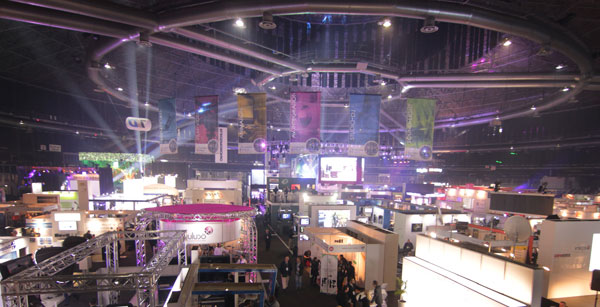Understanding the Difference between Expo Success and Failure!
Simon Robinson, co-owner and organiser of Mediatech Africa, the largest media and entertainment technology trade show on the continent, has been in the exhibitions game for almost 18 years; experience he notched up across various verticals. From sport, to franchising, property, health and beauty, gardening, and technology expos – Robinson has developed a deep understanding of the difference between success and failure in this game, and he says that regardless of the vertical – organisers who fail to consider their exhibitors’ customers are on a fast track to failure.
When it comes to B2B tradeshows, which Robinson finds far more rewarding than the consumer alternative, few have grown in size and stature and been as successful as Mediatech. This biennial B2B show, now in its ninth show, is in fact one of just a few exhibition in this market, to successfully incorporate three diverse industry sectors into one show – each with a different visitor profile. While that may not sound exceptional, what is unique is that each vertical “owns the show” – as if it were being staged entirely for the benefit of that sector. Achieving this seemingly unattainable goal was no accident and a strategic move on Robinson’s part. It’s what makes this show distinctive and he has worked tirelessly with his extended team to accomplish this balance.
This approach is a big part of what he believes makes an expo successful. “At the crux of a trade show’s success is the realisation that you are not just an events co-ordinator. You need to understand the business of the exhibitor. More than that, you must grasp their market – perhaps better than the exhibitor even does. Listen to their business needs. It’s this knowledge that will enable you to deliver the right visitor to the show [and in turn to the exhibitor]. You might get away with below par service right up until the show – but if you deliver the right audience and your exhibitor does good business during the show – almost everything can be forgiven. Fail to achieve this and they will be completely unforgiving,” says Robinson.
Adding to this he says that you need the right mix of reliable, committed suppliers who will deliver on what they promise – even at the eleventh hour – which isn’t unusual in this business. “You also need to surround yourself with a great team who can make everything happen – and often under stressful conditions and time pressures; ultimately every exhibitor becomes your boss. It goes without saying of course, but show success is deeply reliant on robust exhibitor relationships.”
It took Robinson’s team about 15 months before launching the first ever Mediatech show in 2001. Since its inception it has enjoyed tremendous support, growth and success but Robinson says that the road to success is always marred with potholes. One such failing which he believes to be quite common in the industry is not allowing sufficient lead time on a show. “The sales process takes much longer than generally anticipated. Another pitfall is making assumptions. People will not necessarily attend your show just because you think it’s a good idea. This brings us back to knowing the market – without this understanding you are unlikely to get out the starting blocks.
“As anyone in this industry knows – exhibitions don’t always go to plan and the unexpected is inevitable; it’s during these times that you have to rely on the strength of your team to iron issues out and of course – effective contingency plans will save the day. I have seen 20 cars go up in flames at a show; 100km winds have collapsed marquees and massive PA towers have been blown onto cars. It’s for all these reasons that we carry insurance on our shows so when the inevitable happens, you are in a position to refund exhibitors a portion of their costs. Matters of Health and Safety at shows have also become incredibly onerous and the responsibility and liability can land squarely on the organisers’ shoulders. Compliance is an admin intensive exercise but it’s not something to be sidestepped and it’s important to get your house in order,” says Robinson.
Having seen plenty of stands over the years, Robinson says that when it comes to exhibitors – their success is not totally dependent on their stand – it’s the complete package in a B2B environment.
“At the onset, it’s critical for the exhibitor to profoundly understand why they are participating in the show; they must be clear about what they hope to achieve from their investment. Part of this process includes bedding down goals to be achieved. Exhibitions provide brands with a platform to do business with both existing and potential clients and they need to leverage the inherent opportunities that come with the event. It’s an ideal occasion to entertain and engage – so pull out the stops and make it memorable. By far – one of the biggest failings we see with exhibitors – is not having a strategic follow up approach after the show. Leads are generated but the opportunities are lost when post-show communication is absent.”
On the flipside, Robinson says that no matter how strong your marketing and brand messaging is, and even with great [looking] customer-facing teams, you still need to draw in visitors and this is made a lot more difficult if you don’t have an enticing stand.
“It’s not about an elaborate custom-built design; it needs to be impactful so as to stand out from competitors. Find ways that will immerse your customers in your stand and capture their imagination. Always remember your goal, why you are at the expo in the first place, and revisit your audience profile. This will prompt ideas around what’s most likely to entice customers. Combine this with committed follow-ups to show leads, and you’ll ensure your exhibition experience isn’t a wasted one,” he says.
In closing Robinson says, “It’s safe to say the Mediatech evolution came about through the introduction of new verticals to the show. We began as a broadcast and production exhibition and then successfully integrated the live events sector. The AV integration sector followed. Our growth has definitely been driven by on boarding these new markets. Not just that, we were able to deliver a uniquely different visitor to each sector. Exhibition organisers need to find what makes their expo matchless and then develop it – constantly adding to it to keep it relevant and interesting.”
Unmatched in potential; Mediatech is an experience which visitors immerse themselves in, leaving invigorated and inspired by the possibility of opportunity and a fast forward glimpse into the future. Delegates wishing to register for the event (19 – 21 July) can sign up now: https://event-rsvp.com/MediatechAfrica2017/.
Boiler Plate:
Mediatech Africa is an engaging biennial trade show that brings creative thought to life within six verticals: Broadcast – TV & Radio; Film & Video Production; Digital Media; Pro Audio – Lighting – Staging; Audio Visual Integration; and Studio – Recording – DJ. An unmatched platform for networking, education and entertainment, this high energy – high impact event is all about the seamless integration of technology and creativity. It’s about making the impossible possible. It’s about innovation and bringing ideas to life using the latest tech. The three day event attracts global and local brands who are at the forefront of their industries. Thought leaders, decision makers and the highest calibre influencers who are shaping tech trends and the very industry itself – attend the showcase. By design, Mediatech Africa is an experience which visitors immerse themselves in, leaving invigorated and inspired by the possibility of opportunity and a fast forward glimpse into the future. Visit Mediatech Africa on www.mediatech.co.za
Mediatech Africa is co-owned by Sun Circle Publishers and Reed Exhibitions South Africa.
#imagination #innovation #techtrends























































































